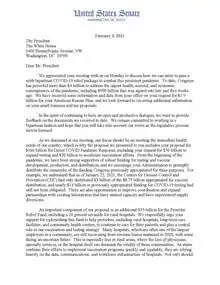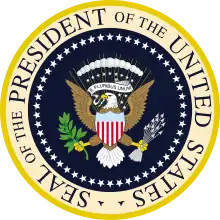American Rescue Plan
The American Rescue Plan is a $1.9 trillion economic stimulus package proposed by President Joe Biden to speed up the United States' recovery from the economic and health effects of the COVID-19 pandemic and the ongoing recession. He plans to pass this as one of his first bills into law through the 117th Congress.[2] First proposed on January 14, 2021, the package builds upon many of the measures in the CARES Act from March and in the Consolidated Appropriations Act, 2021 from December.[3][4]
.svg.png.webp) | |
| Full title | Emergency Legislative Package to Fund Vaccinations, Provide Immediate, Direct Relief to Families Bearing the Brunt of the COVID-19 Crisis, and Support Struggling Communities[1] |
|---|---|
| Acronym | ARP |
| Colloquial name(s) | American Rescue Plan |
| Introduced in | 117th United States Congress |
| Introduced on | February 2, 2021 |
| Legislative history | |
| |
Beginning on February 2, 2021, Democrats in the United States Senate started to open debates on a budget resolution that would allow them to pass the stimulus package without support from Republicans through the process of reconciliation. The Senate voted 50-49 to approve the resolution, and the House voted 218-212 to approve the resolution. A vote-a-rama session started two days later after the resolution was approved, and the Senate introduced amendments in the relief package. The day after, Vice President Kamala Harris cast her first tie-breaking vote as to give the Senate final approval to start the reconciliation process, with the House following suit by voting 219-209.
Provisions
The New York Times reported that key elements of the plan include:
- Extending expanded unemployment benefits with a $400 weekly supplement through end of September (vs. March 31 currently)
- $1,400 direct payments to individuals
- $20 billion for a national vaccine program, including preparation of community vaccination centers
- Funding for 100,000 public health workers for vaccination outreach and contact tracing
- Funding to help address disproportionate impact on people of color, for community health centers, prisons, and jails
- Emergency paid leave for over 100 million Americans
- Tax credits for families to offset up to $8,000 in annual child care costs
- Aid to renters with unpaid debts to landlords
- Grants to small businesses
- Funds to accelerate vaccine deployment and to safely reopen most schools within 100 days
- $350 billion to help state and local governments bridge budget shortfalls.[4]
On February 8, 2021, Democrats are expected to unveil legislation that will provide $3,000 per child to tens of millions of American families and $250 per month to millions as part of the relief package. The bill will also allow the Internal Revenue Service to provide $3,600 over the course year for children under 6. The size of the benefit benefit would diminish for Americans earning more than $75,000 per year. The proposal was backed by Senator Mitt Romney of Utah, who introduced a similar bill four days earlier.[5]
Background
Impact of the COVID-19 pandemic
The United States went under an economic recession, and roughly 400,000 Americans died due to the public health crisis.[6][7]
Previous COVID-19 pandemic legislation
Prior to the American Rescue Plan, the CARES Act from March and in the Consolidated Appropriations Act, 2021 from December were both signed into law by then-President Donald Trump. Trump previously expressed support for a direct payments of $2,000 along with Joe Biden and the Democrats. Even though Trump called for congress to pass a bill increasing the direct payments from $600 to $2,000, then-Senate Majority Leader Mitch McConnell blocked the bill.[8] Prior to the Georgia Senate runoffs, Biden said that the direct payments of $2,000 would be passed if Jon Ossoff and Raphael Warnock won their seats, but also warned that it wouldn't pass if either Kelly Loeffler or David Perdue won.[9] On January 14, prior to being inaugurated as President, Biden announced the $1.9 trillion stimulus package.[10]
Legislative history
Negotiations

Ten Republican senators announced plans to unveil a roughly $600 billion COVID-19 relief package as a counterproposal to President Joe Biden's $1.9 trillion plan meant to force negotiations. The senators, including Susan Collins of Maine, Lisa Murkowski of Alaska, Mitt Romney of Utah and Rob Portman of Ohio, told Biden in a letter that they devised the plan "in the spirit of bipartisanship and unity" that the President has urged and said they planned to release a full proposal on February 1.[11] On the same day, House Speaker Nancy Pelosi and Senate Majority Leader Chuck Schumer introduced a budget resolution co-sponsored by Bernie Sanders as a step to pass the legislation without support from the Republican Party.[12] The next day, Biden met with Majority Leader Schumer and other Democrats regarding the relief package.[13]
On February 7, Transportation Secretary Pete Buttigieg and Treasury Secretary Janet Yellen expressed support for the stimulus package. Yellen said that the funding would help millions of Americans and rejected concerns the colossal spending could cause inflation.[14] Yellen also said that the stimulus package would restore full employment by 2022.[15]
Budget resolution passage
The United States Senate voted 50–49 to open debate on the resolution, which would allow Democrats to pass the relief package without support from Republicans through the process of reconciliation.[16][17] The House voted 218–212 to approve the budget resolution.[18] On February 4, a vote-a-rama session began, and the Senate introduced amendments to the relief package, including a amendment in a 90–10 vote that would provide direct relief to the restaurant industry.[19][20]
One of the many non-binding budget amendments in the vote-a-rama session was meant to prohibit people who are in the country illegally from receiving pandemic relief checks. The non-binding amendments are not likely to have any effect on the final relief bill. The minority party uses the hundreds of non-binding votes in the hours-long vote-a-rama session to send messages. Under current law, people in the country illegally are already prohibited from receiving checks. The amendment passed with eight Democrats joining all Republicans.[21] Vice President Kamala Harris cast her first tie-breaking vote as Vice President to give final Senate approval to the reconciliation bill, sending it to the House to approve the changes, and allowing drafting of the relief bill to begin in the committees.[22] The House approved the resolution 219–209, with Jared Golden being the sole Democrat to join all Republicans in opposition to the bill due to a preference for a separate vaccine bill instead of the longer reconciliation process.[23]
Budget reconciliation passage
President Biden expressed doubt that his push to increase the federal minimum wage to $15 an hour would be included in the final coronavirus relief package.[24][25] Biden predicted that under Senate rules for budget reconciliation would prevent the increase from going forward. Sanders and his allies argued that the higher wage would reduce the amount of federal assistance low-income individuals receive and increase their taxable income — meeting the Senate parliamentarian’s requirement that any reconciliation measure have an effect on the federal budget. Democrats like Sen. Joe Manchin (D-W.V.), who opposes raising the minimum wage to $15 an hour, could resist the measure.[25] 67% of Americans support increasing the minimum wage to $15 an hour.[26] On February 8, the Congressional Budget Office said that increasing the minimum wage to $15 would lift 900,000 people out of poverty, but also warned that it could increase the deficit to $54 billion and reduce the employment rate to 1.4 million.[27]
See also
- List of COVID-19 pandemic legislation
- COVID-19 pandemic in the United States
- Coronavirus Preparedness and Response Supplemental Appropriations Act, 2020
- Families First Coronavirus Response Act
- Coronavirus Aid, Relief, and Economic Security Act (CARES Act) - Includes $1200 stimulus checks
- Paycheck Protection Program and Health Care Enhancement Act
- Paycheck Protection Program Flexibility Act of 2020
- A bill to extend the authority for commitments for the paycheck protection program
- Consolidated Appropriations Act, 2021 - Includes $600 stimulus checks.
References
- "President Biden Announces American Rescue Plan". The White House. January 20, 2021.
- "American Rescue Plan: Inside Biden's $1.9 Trillion Stimulus". SmartAsset. 2021-01-15. Retrieved 2021-01-16.
- Luhby, Tami; Lobosco, Katie (2021-01-14). "Here's what's in Biden's $1.9 trillion economic rescue package". CNN. Retrieved 2021-01-16.
- Tankersley, Jim; Crowley, Michael (2021-01-14). "Here are the highlights of Biden's $1.9 trillion 'American Rescue Plan.'". The New York Times. ISSN 0362-4331. Retrieved 2021-01-16.
- Stein, Jeff (February 7, 2021). "Senior Democrats to unveil $3,000-per-child benefit as Biden stimulus gains steam". The Washington Post. Retrieved 7 February 2021.
- Fisher, Marc; Rozsa, Lori; Kreidler, Mark; Gowen, Annie. "400,000: The invisible deaths of covid-19". Washington Post. Retrieved 2021-02-07.
- "U.S. Covid death toll passes 400,000". NBC News. Retrieved 2021-02-07.
- Gregorian, Dareh (December 29, 2020). "McConnell blocks Senate Democrats' move to pass $2,000 coronavirus checks". NBC News.
- Duffy, Kate (January 5, 2021). "Biden tells Georgia voters that $2,000 stimulus checks will never arrive if Republicans win Senate runoffs". Business Insider.
- Mason, Jeff; Renshaw, Jarrett (January 14, 2021). "Biden unveils plan to pump $1.9 trillion into pandemic-hit economy". Reuters.
- CNN, Analysis by Stephen Collinson. "Analysis: Biden faces presidency-defining dilemma over Republican offer on Covid-19 rescue plan". CNN. Retrieved 2021-02-01.
- Quinn, Melissa; Turman, Jack (February 2, 2021). "Democrats introduce budget resolution, kicking off fast-track process to pass COVID package". CBS News. Retrieved February 2, 2021.
- Carney, Jordain (February 3, 2021). "Schumer vows Democrats 'united' after Biden meeting on coronavirus". The Hill. Retrieved 4 February 2021.
- Shahrigian, Shant (February 7, 2021). "Janet Yellen, Pete Buttigieg push $1.9T stimulus package". New York Daily News. Retrieved 7 February 2021.
- Crutsinger, Martin (February 7, 2021). "Yellen: Biden's plan could restore full employment by 2022". ABC News. Retrieved 7 February 2021.
- Wasson, Erik (February 2, 2021). "Senate Democrats Move to Put Biden Stimulus Plan on Fast Track". Bloomberg. Retrieved February 5, 2021.
- Zeballos-Roig, Joseph (February 2, 2021). "Senate Democrats take the first step to pass Biden's $1.9 trillion stimulus package on their own as the administration stands by it". Business Insider. Retrieved February 2, 2021.
- Elis, Niv (February 3, 2021). "House approves budget resolution for COVID-19 package". The Hill. Retrieved 4 February 2021.
- Fantozzi, Joanna (February 4, 2021). "The Senate overwhelmingly passed restaurant relief budget resolution amendment". nrn.com.
- Kapur, Sahil (February 4, 2021). "Democrats take new step to fast-tracking Covid relief as Senate 'vote-a-rama' begins". NBC News. Retrieved 5 February 2021.
- Wingerter, Justin (February 4, 2021). "Sen. John Hickenlooper frustrates immigration activists with vote to block some from stimulus checks". The Denver Post. Retrieved February 5, 2021.
- "Senate passes key budget bill for COVID-19 relief, with Harris as tiebreaker". Los Angeles Times.
- "House passes budget resolution, paving way for Biden's COVID-19 relief plan". The Hill. February 5, 2021.
- "Biden wants fast COVID aid, but minimum wage hike in doubt". AP NEWS. 2021-02-05. Retrieved 2021-02-07.
- Levine, Marianne. "Biden casts doubt on $15 minimum wage hike in Covid relief package". POLITICO. Retrieved 2021-02-07.
- Elbeshbishi, Sarah. "Biden says minimum wage increase probably not 'going to survive' as part of COVID-19 relief package". USA TODAY. Retrieved 2021-02-07.
- Morath, Eric (February 8, 2021). "$15 Minimum Wage Would Cut Employment, Reduce Poverty, CBO Study Finds". The Wall Street Journal. Retrieved 8 February 2021.
External links
 Media related to American Rescue Plan at Wikimedia Commons
Media related to American Rescue Plan at Wikimedia Commons

